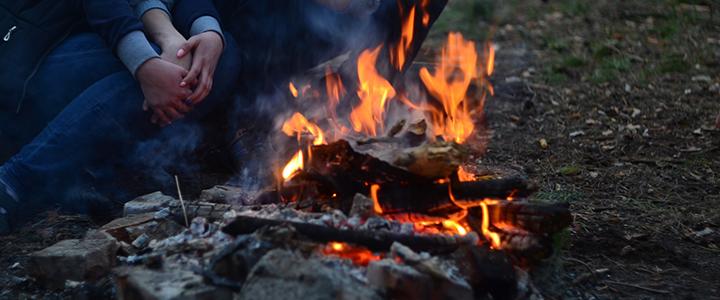
August 2019: Keep Your Campfires Clean
Whether at one of the 250 campgrounds in New Hampshire or at home (with a proper burn permit obtained), many people like to sit around a campfire roasting marshmallows or hot dogs, or keeping warm on a crisp fall night. You may be tempted to throw your extra trash in the fire for easy disposal, but burning trash can actually contaminate your food and the air you breathe. When items like candy wrappers, plastic bottles, metal cans, Styrofoam or even newspapers are thrown into a campfire, they release harmful chemicals like benzene, lead, cadmium and formaldehyde. These may be dangerous for you and your family to breathe in and does damage to the environment, too.
It is also illegal to burn trash in New Hampshire, in both open fires and in fireplaces, woodstoves, chimineas, burn barrels and the like.
Open burning of trash and smoke inhalation may cause several health issues, including respiratory infections, damage to internal organs, and skin irritation and rashes. In addition to releasing chemicals into the air, open burning of trash pollutes the air, accelerating ozone depletion. The nitrogen oxide released from burning harms animal and plant life, hindering their ability to circulate the air we breathe. Moreover, open burning could easily become uncontained if not done correctly, causing an actual fire and potential damage to your property and neighborhood.
There are many safer ways to dispose of your trash, rather than burning it. Here are some tips:
- Instead of throwing trash into the fire, make sure to have a garbage bag or cardboard box nearby.
- Construction and demolition debris cannot be burned either, even with a permit. This type of debris includes fencing, wood, glass, bricks, dry wall, etc. Visit this NHDES fact sheet for more information about construction debris.
- New Hampshire towns and cities are required by law to provide solid waste management facilities for residents. Most communities provide curbside pickup of trash and recyclables. However, if your town does not, there are most likely transfer stations and facilities for trash disposal. Call your local town office if you have any questions about how to dispose of your waste. Your town may also have a list of solid waste haulers that can provide pickup for a fee.
- To reduce the amount of trash your household makes, consider recycling. It is a great way to decrease your garbage load. Most communities have recycling programs and/or transfer stations. Homeowners are strongly encouraged to properly recycle glass, plastics, newspaper, aluminum cans, cardboard and other materials.
- Composting appropriate wastes, such as fruit and vegetable peels and coffee grounds, is another great way to reduce your trash. Composting produces valuable soil fertilizer for your garden and lawn.
For more information, visit the NHDES fact sheet ARD-33 “Burning of Residential Trash: Health & Environmental Risks and Proper Disposal” or contact the Air Resources Division at (603) 271-1370.
Do your friends, family and nature a favor and only burn clean, dry wood. For more information, talk to the campground owner or visit the NHDES Open Burning webpage.
This GREENWorks article can be also be found in our document library.




